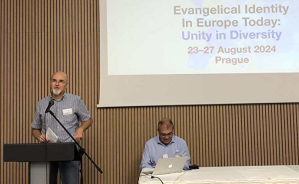
Leaders of the Conseil National des Évangéliques de France (CNEF) have reported back from a key conference looking at evangelical identity in Europe in anticipation of the Lausanne Conference in South Korea later this month, September 2024. They pointed to what they consider the most suitable definition for evangelicals, recognizing the diverse cultural and historical contexts in which they live across Europe.
Erwan Cloarec, president, Yann Antoine, vice-president, and Clément Diedrichs, general manager, all from CNEF, joined leading scholars for an event headlined ‘Evangelical Identity in Europe Today: Unity in Diversity’ held in Hotel Olšanka, Prague, Czechia, from August 23 to 27.
The event was run jointly by Fellowship of European Evangelical Theologians (FEET) and the European Evangelical Alliance (EEA), in partnership with Sdružení Evangelikálních Teologů (SET), an evangelical body for Czech theologians.
Subjects explored included what unites evangelicals, how their diversity can be mapped and how they relate to the wider Christian world.
In a joint statement for CNEF after the event, the French leaders referred to ‘The Cambridge Companion to Evangelical Theology,’ edited by academic and theologian Timothy Larsen, in defining an evangelical person as someone emphasizing reconciliation with God through the atoning work of Jesus Christ on the cross; giving a preeminent place to the Bible’s divine authority; emphasizing the work of the Holy Spirit in justification and sanctification, including the mission of witnessing to the gospel; and someone who is part of evangelical church history.
“Although united by their common faith (at the theological level), the diversity of contexts colors the way of living the faith and practice of the evangelical protestant churches: the very catholic historical context in Spain, Italy and Portugal in particular, the post-Soviet and orthodox context in Eastern Europe, the context of the majority national church (Lutheran Church in Northern Europe, Orthodox in Greece, [and] Anglican in the United Kingdom),” said the CNEF leaders.
Having reflected upon discussions at the Prague event, the CNEF leaders summarized the specificity of European evangelical protestantism within the parameters of four aspects.
Firstly, the fact that Europe is the historic “cradle of evangelicalism.” Secondly, the challenge of secularization of societies, which includes where state churches are located.
The third aspect noted the comparison between the minority of evangelical Protestants in societies set against the growth of churches due to the arrival of evangelical Christians from other continents and the ongoing development of the Pentecostal movement.
Meanwhile, the fourth aspect involved discussions about the role of evangelicals within the world of politics.
“There is a shared concern about the risk of being exploited by populist parties,” said the leaders in the statement. “These issues call first of all for education, particularly on the biblical notion of ‘nation,’ but also an effort to talk with people attracted by these political currents in a pastoral approach.”
Overall, the event was summarized by the leaders as a “time of exchange and welcome theological reflection between brothers and sisters in Christ, which allows a better understanding of the roots and common challenges of evangelical Protestants in Europe.”
Asked why it was important to identify someone as evangelical or not, a spokesman for CNEF responded to Christian Daily International by referring to a ‘Together on a Mission’ statement by the evangelical organization last year, 2023.
“God's sons are not all included in the evangelical denomination, so why is it important to identify clearly who we are? Because we can easily work together, and make partnerships for a shared missional impetus.”
The 2023 statement further highlighted the importance of unity in the Church so that it can seek to “attain the measure of the stature of the fullness of Christ.” (Eph. 4:13). CNEF in the statement also expressed the desire to foster new partnerships in missional work.
“We want to encourage generous and fruitful collaboration at all levels: local, national, and international, in urban and rural areas, but also between evangelical actors: local churches of all cultures, church denominations, charities, centers of theological education, and workplace leaders.”





